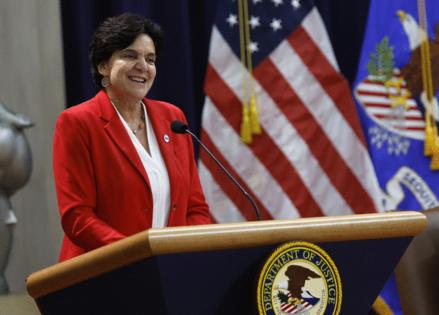White House seeks to diminish Office on Violence Against Women
Published in News & Features
WASHINGTON — The Trump administration has asked Congress to delete a portion of a federal law that requires the Office on Violence Against Women to be a separate office within the Justice Department, part of a shake-up experts say would hamstring the office’s visibility and saddle victim grant programs with more bureaucracy.
The White House, in the fine print of its fiscal 2026 budget request appendix released last week, proposed a 29% cut to appropriated OVW program funding, writing that it and other department grant-making components “will be consolidated” into the Office of Justice Programs.
As part of the budget request, the White House includes proposed language that would entirely delete a subsection of law that requires OVW to be “a separate and distinct office” within the DOJ, with a director who reports to the attorney general and has “final authority over all grants, cooperative agreements, and contracts awarded by the Office.”
Congress passed a provision establishing the office’s separate status in the 2000s, according to the department’s website. Just three years ago, Congress strengthened the provision by adding language that stipulated the OVW shall be “not subsumed by any other office.”
Now, the Trump administration wants the entire provision stripped amid an effort to reshape the Justice Department, a broader push that’s included terminating certain DOJ grant money and proposing a reduction in the department’s discretionary funding.
If the Trump administration moves forward with the grant-making consolidation, it is unclear how much of the original OVW structure would survive, including whether the entity would keep its name under a larger component, or how grant programs currently administered by the office would be handled.
Terri Poore, policy director at the National Alliance to End Sexual Violence, said consolidating OVW would build in inefficiency and ineffectiveness into grant operations, and would have a “devastating” impact on local programs that rely on the expertise of the office.
“Consolidating OVW would be a very serious threat to the mission to respond to crimes of violence against women in our country,” she said, adding that consolidation would have a “detrimental trickle-down effect” to the response system to sexual assault and domestic violence.
Supporters of the office say OVW has a history of developing expertise on issues of domestic violence, stalking and sexual assault, something that allows the staff to target grant funding, identify gaps and better respond to the needs of survivors.
More broadly, the Trump administration has sought to address what it sees as waste, fraud and abuse in the federal government.
The Trump administration argued in the budget appendix that the consolidation “will eliminate duplicative positions, infrastructure, and programs.”
“The Department continues to analyze the best method to effectuate this merger, including the name of this component,” according to the document.
But Rosie Hidalgo, a former office director who served under the Biden administration, said in a written response to questions that consolidation would make administering Violence Against Women Act grants less efficient because it would “undermine the ability of the OVW Director to exercise leadership” in implementing VAWA grant programs.
It would simply lead to additional layers of bureaucracy, she said, adding that scrapping its separate component status would diminish the role of the office within the department and across other federal agencies.
“It would convey a de-prioritization of our nation’s commitment and efforts to prevent and address violence against women,” Hidalgo said.
Some grants administered by the office would see their funding cut under the Trump administration’s fiscal 2026 budget, including efforts that go toward helping survivors of domestic violence, sexual assault and dating violence.
The administration argues the budget proposal would realign Violence Against Women Act funding “with its original core mission to combat violence against women and directly serve victims—eliminating extraneous programs that divert resources from these core functions,” according to a budget document.
The administration argued that grant funding from the office has been “offered for biological men.”
Overall, the administration’s budget request would provide $505.5 million for programs administered by the office, a 29 percent cut compared to appropriated funding from Congress for fiscal 2025.
A cut of that magnitude would be “a slap in the face to survivors all over the country,” said Jean Bruggeman, the executive director of Freedom Network USA, a coalition of anti-trafficking service providers and survivors.
Crimes addressed by OVW, such as domestic violence, sexual assault, stalking and dating violence, are persistent problems that require extensive coordination and resources, Bruggeman said. Cuts that big will simply mean a cut to services, she argued.
“You’re going to leave survivors without a confidential counselor, without medical assistance, without emergency shelter and without accompaniment into courthouses to go through getting protection orders,” she said.
Under the proposal, one grant program that assists domestic violence and sexual assault survivors with transitional housing would see a 20 percent decrease in appropriated funding.
A victim legal assistance program would see a 27% cut in appropriated funding.
One other program, the Sexual Assault Services Formula Grant Program, helps states support rape crisis centers and other groups that provide services to victims of sexual assault and their families. Under the proposal, it would be cut by 23% compared to current appropriated funding.
A separate program is related to strengthening law enforcement and prosecution strategies to fight violent crimes against women, along with developing victim services in those cases. It would see a 25 percent cut under the proposal, leaving it tens of millions of dollars short compared to the current appropriated funding level.
©2025 CQ-Roll Call, Inc., All Rights Reserved. Visit cqrollcall.com. Distributed by Tribune Content Agency, LLC.







Comments